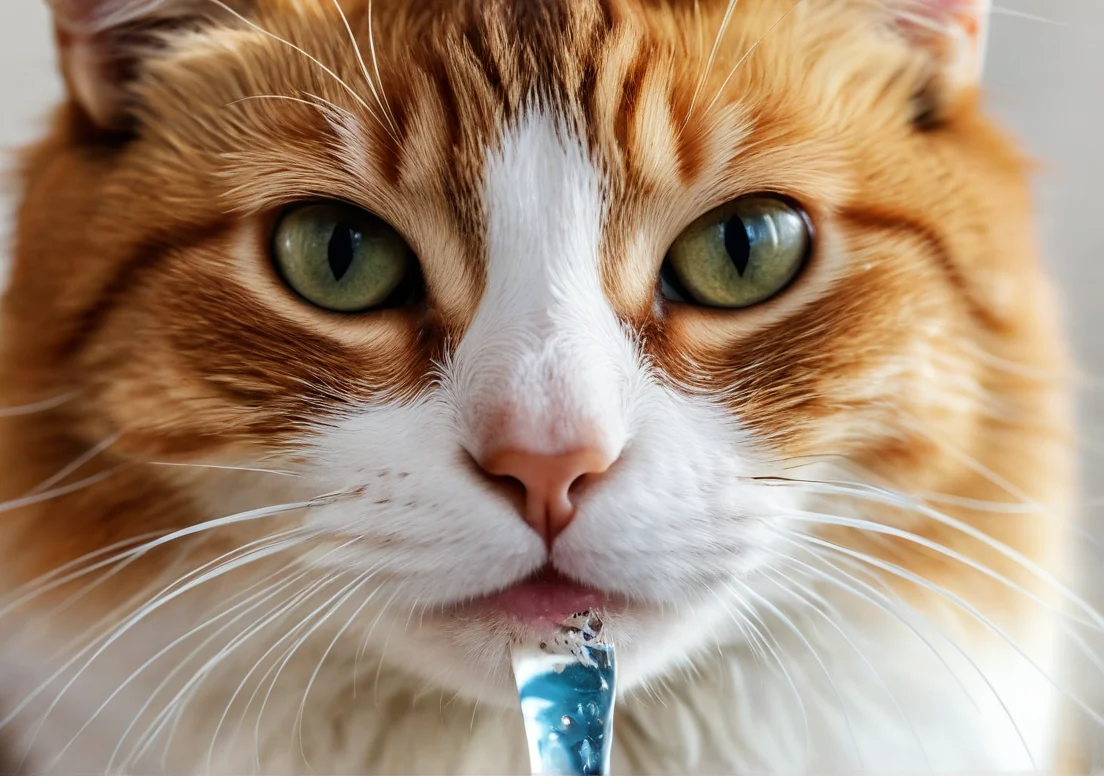Have you noticed your cat coughing after quenching its thirst? It’s an uncomfortable moment and can make you wonder what’s going on inside that furry little body.
Coughing in cats after drinking water can occur for several reasons, including drinking too quickly, water entering the windpipe, or even underlying health concerns like asthma. There’s a bit more depth to this symptom than just these possibilities, so stay with us to uncover what could be causing this curious behavior in your feline friend.

Why Does Your Cat Cough After Drinking Water
Coughing in cats can be perplexing, especially if it happens right after they take a sip of water. One reason might be liquid entering the airway instead of going down the esophagus. Cats are often playful and might get a little too excited when drinking, leading to abrupt movements that can cause water to go down the wrong way. If this is a one-off event, it’s probably nothing to worry about.
Another potential cause is food or water temperature. Cats can be sensitive to extremes—if the water is too cold, it may trigger a cough reflex. Furthermore, breeds with flatter faces, like Persians and Himalayans, might be more vulnerable since their anatomical structure can complicate swallowing.
Lastly, underlying medical issues such as allergies, respiratory infections, or even heart conditions could play a role. If coughing happens frequently or is accompanied by other symptoms like lethargy or loss of appetite, it’s time to consult your vet for a thorough check-up.
Can Drinking Too Fast Cause Coughing?
Absolutely! Cats can be quite the little gulpers. When they drink too quickly, they might end up inhaling a bit of water instead of swallowing it properly. This can trigger a coughing fit as their body tries to clear the airway.
To help prevent this, consider the following tips:
Use a wider bowl : A broader surface area may encourage slower drinking, giving your kitty a moment to breathe.
Implement water fountains : Cats often prefer running water, and fountains can entice them to drink more comfortably and at a steadier pace.
Observe portion sizes : Offering smaller amounts of water can discourage rapid drinking and help manage their intake.
Adjusting these simple behaviors can often make a world of difference for your feline friend, keeping them hydrated without the coughing fits.
Is Water Getting Into the Windpipe?
Coughing after your cat drinks water can often be linked to inhalation of the liquid into the windpipe. Cats, like us, have a complex system that oversees drinking and breathing. If they gulp water too quickly or tilt their heads awkwardly, it’s possible for some water to accidentally enter the trachea instead of going straight down the esophagus. This can trigger a reflexive cough as their body attempts to clear the irritant.
Pay attention to how your cat drinks. If they seem to slurp or get overly excited, it may be worth offering smaller amounts of water at a time or choosing a wider bowl that allows easier sipping. Keeping an eye on their drinking habits might help you spot a pattern or a particular behavior that leads to these coughing incidents.
What Health Issues Could Be Involved?
Coughing isn’t always harmless, and it can sometimes indicate deeper health concerns. If your cat’s cough after drinking is persistent, several medical conditions might be at play:
Asthma : A common respiratory issue in cats that might cause coughing, especially if it’s accompanied by wheezing or labored breathing.
Allergies : Just like people, cats can have allergies that affect their airways and cause coughing, whether it’s from dust, pollen, or even certain food ingredients.
Infections : Respiratory infections, such as bronchitis or pneumonia, can lead to frequent coughing and may be a more significant concern if they’re also showing lethargy or loss of appetite.
Heart Disease : Conditions like congestive heart failure can cause a cat to cough due to fluid buildup in the lungs.
Foreign Bodies : If something gets lodged in your cat’s throat, like food or a small object, it can induce coughing, especially after drinking when the throat is busy.
Observing any additional symptoms—such as changes in breathing, appetite, or overall behavior—can be critical for pinpointing the problem. If you’re unsure or if the coughing continues, it’s wise to consult your vet for a check-up. They’ll provide guidance tailored to your kitty’s specific circumstances and help rule out serious issues.
Are There Certain Breeds at Higher Risk?
Specific cat breeds can be more prone to coughing episodes after drinking water. For instance, Burmese and Siamese cats often have more delicate respiratory systems. Their unique anatomy makes them susceptible to conditions like asthma, which can lead to coughing. Similarly, Persian cats, known for their flat faces, may experience breathing difficulties that could manifest as coughing, particularly when taking quick gulps of water.
In addition, cats with brachycephalic traits—those with short, wide skulls—might struggle with water intake. These physical characteristics can lead to an increased risk of aspirating water, causing coughing spells. If you have one of these breeds, it’s worth keeping an eye out for unusual coughing habits after drinking.
How Can You Help Your Cat Drink More Safely?
Encouraging a calmer drinking experience can significantly reduce coughing incidents. Here are some practical tips to consider:
Use a shallow bowl : Cats often feel more comfortable with a wider surface area, which helps them drink at a slower pace.
Elevate the bowl : Raising the bowl slightly off the ground can help your cat maintain a more natural posture, reducing the risk of gulping air while drinking.
Encourage slower sips : Try to offer smaller amounts of water more frequently. Cats might feel less rushed this way, allowing them time to drink without coughing.
Monitor drinking habits : Keep track of how often your cat drinks and whether coughing is linked to specific times or behaviors.
Consider a pet fountain : Cats tend to be more attracted to flowing water, which can encourage them to drink more gently.
A unique angle involves training your cat to drink calmly. Use positive reinforcement techniques—reward your cat with treats or affection when they drink without rushing. Over time, they may develop a more relaxed approach to their hydration routine.
Trivia: Cat Coughing and What It Means
Coughing in cats, especially after drinking water, can raise a few eyebrows. It often relates to a few common anatomical or health factors. For starters, cats have a unique throat structure, with a narrow trachea that can make them more prone to coughing if they accidentally swallow air.
Sometimes, a little water goes down the wrong way, triggering a cough reflex as their body tries to clear the airways. Additionally, conditions like asthma or allergies might be at play if your kitty coughs frequently. A cat’s cough can also be a sign of more serious issues like respiratory infections or heart disease. Keep an eye on other signs, like lethargy or changes in appetite, as these can be indications that a visit to the vet is necessary.
Recent Research on Cat Health and Drinking Habits
Recent findings highlight a significant connection between a cat’s drinking habits and overall health. Studies suggest that the type of water cats drink influences hydration levels. For instance, tap water that contains chlorine may lead some cats to drink less, increasing their risk of dehydration. This is crucial since dehydration can exacerbate conditions that might cause coughing.
Moreover, a study published in the Journal of Feline Medicine and Surgery emphasizes that cats are often sensitive to changes in their environment, including their water bowls. Cats may prefer filtered or fresh water, which can encourage better drinking habits. If your cat’s drinking patterns shift—like suddenly drinking too fast or more often—it’s worth monitoring for coughing or other symptoms.
Alex, a passionate animal lover, has experience in training and understanding animal behavior. As a proud pet parent to two dogs and three cats, he founded AnimalReport.net to share insights from animal experts and expand his knowledge of the animal kingdom.




